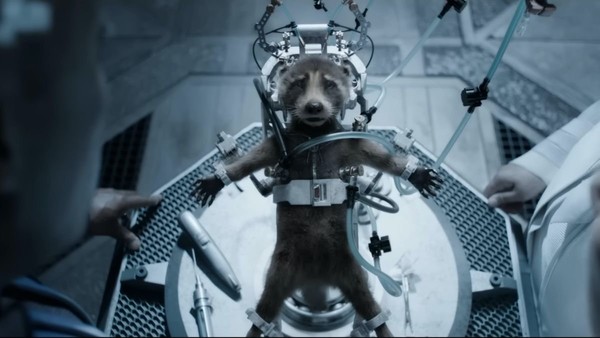The Guardians of the Galaxy series has gained significant attention due to its unique blend of humor, action, and engaging storytelling. The most recently released Vol. 3 is also doing what only a few movies have ever done: it portrays a compassionate story about animal testing, which has sparked discussions regarding the ethical treatment of animals. James Gunn, the director and writer of the series, centers the film around Rocket Raccoon and his tragic origin of hyper-intelligence, effectively promoting an awareness of animal cruelty.

Guardians of the Galaxy Vol. 3 introduces the main villain High Evolutionary, whom the Guardians battle against to save the mortally wounded Rocket. The mission of High Evolutionary is to “create a perfect society”, unhesitatingly inflicting pain on anyone who crosses his path. He would test on animals — which evolved them — and if things didn’t go the way he wanted, he would burn them alive. Rocket was one of the victims: while he was comatose, he experiences flashbacks of how he was experimented on and how he built close relationships with his fellow animal prisoners. Only the emotional support from his cybernetically engineered friends helps him endure the agony of the sadistic experiments.
Although all depictions of the animals were created through digital effects in the making of the movie, the horrendous scenes of animal cruelty are somewhat disturbing. Characters subject to experimentation were given ID numbers instead of names, tattooed directly on their bodies; Rocket’s was tattooed on his chest. They were also kept in a cramped cage with little or no enrichment. The restraining device in the scene where Young Rocket is strapped for experimentation by The High Evolutionary and OrgoCorp scientists is uncannily similar to those in reality.. The realistic depictions of the animal testing contributed largely to what Gunn has intended to produce: a crafted blockbuster movie that covers real-life animal testing in a very visceral way. Gunn commented in an interview that Rocket was “created by somebody who didn’t care for him at all, didn’t have any of his own interests in mind”. He added, “Compassion is the answer to all your problems on this planet. And if you can have compassion for all living things, it really helps you to live a much more fulfilling life.”
The franchise leverages its influence to spark conversation and encourage the audience — which ranges from the young fans of the film franchise to the adult fans of the Marvel comics — to consider the ethical implications of animal testing. Perhaps what is most effective in highlighting animal cruelty in Guardians of the Galaxy Vol. 3 is the emotional bond that the audience have with Rocket as the protagonist. In response to the compelling portrayal of Rocket and his fellow animal friends, People for the Ethical Treatment of Animals (PETA) has awarded Gunn with a Not a Number Award, highly praising the film as “an animal rights masterpiece”.
As shown in the film, animal testing is not very successful. In practice, The National Institute of Health admits that despite fundings of 12 billion USD every year, 95 percent of animal tests fail to translate to humans. Yet, it has severe effects on animals. For instance, The Physicians Committee for Responsible Medicine (PCRM) found that one rhesus monkey’s — from one of Neuralink’s experiments — nausea was “so severe that the animal vomited and had open sores in her esophagus before she was finally killed.” However, animal testing is still prevailing at present. The Humane Society provided an estimate that 50 million animals are used in testing and experiments each year. It is also notable that Neuralink, a brain-computer interface startup, has been under investigation by the US Department of Agriculture’s inspector general for potential violations of the Animal Welfare Act, killing about 1,500 animals after the experiments since 2018.
Admittedly, there are challenges in completely eradicating animal testing: the testing of drugs and medicine have benefited largely and has been proven to be much safer after applying animal-based testing models. Despite this, many agree that a paradigm shift in all forms of animal testing is needed, regardless of whether it is motivated by an ethical commitment or an interest in finer science. Hopefully, with people showing a little more empathy, compassion, and solidarity, we can expect the liberation of more animals in the near future.

